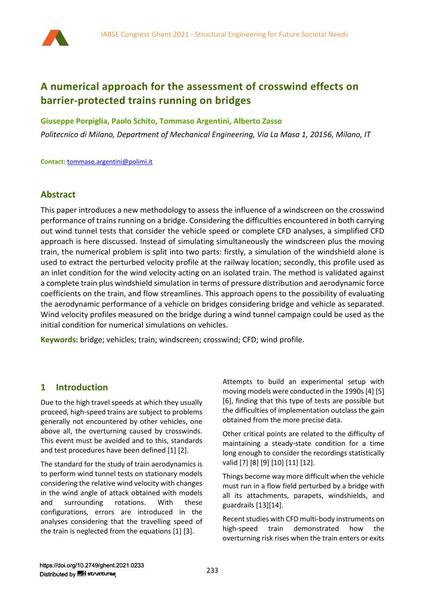A numerical approach for the assessment of crosswind effects on barrier-protected trains running on bridges

|
|
|||||||||||
Bibliographic Details
| Author(s): |
Giuseppe Porpiglia
(Politecnico di Milano, Department of Mechanical Engineering, Via La Masa 1, 20156, Milano, IT)
Paolo Schito (Politecnico di Milano, Department of Mechanical Engineering, Via La Masa 1, 20156, Milano, IT) Tommaso Argentini Alberto Zasso (Politecnico di Milano, Department of Mechanical Engineering, Via La Masa 1, 20156, Milano, IT) |
||||
|---|---|---|---|---|---|
| Medium: | conference paper | ||||
| Language(s): | English | ||||
| Conference: | IABSE Congress: Structural Engineering for Future Societal Needs, Ghent, Belgium, 22-24 September 2021 | ||||
| Published in: | IABSE Congress Ghent 2021 | ||||
|
|||||
| Page(s): | 233-240 | ||||
| Total no. of pages: | 8 | ||||
| DOI: | 10.2749/ghent.2021.0233 | ||||
| Abstract: |
This paper introduces a new methodology to assess the influence of a windscreen on the crosswind performance of trains running on a bridge. Considering the difficulties encountered in both carrying out wind tunnel tests that consider the vehicle speed or complete CFD analyses, a simplified CFD approach is here discussed. Instead of simulating simultaneously the windscreen plus the moving train, the numerical problem is split into two parts: firstly, a simulation of the windshield alone is used to extract the perturbed velocity profile at the railway location; secondly, this profile used as an inlet condition for the wind velocity acting on an isolated train. The method is validated against a complete train plus windshield simulation in terms of pressure distribution and aerodynamic force coefficients on the train, and flow streamlines. This approach opens to the possibility of evaluating the aerodynamic performance of a vehicle on bridges considering bridge and vehicle as separated. Wind velocity profiles measured on the bridge during a wind tunnel campaign could be used as the initial condition for numerical simulations on vehicles. |
||||
| Keywords: |
bridge train CFD vehicles windscreen crosswind wind profile
|
||||
| Copyright: | © 2021 International Association for Bridge and Structural Engineering (IABSE) | ||||
| License: | This creative work is copyrighted material and may not be used without explicit approval by the author and/or copyright owner. |
||||
